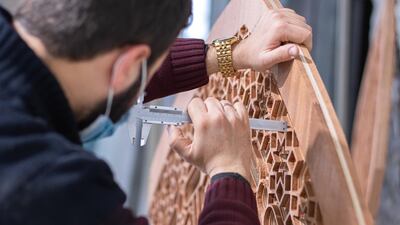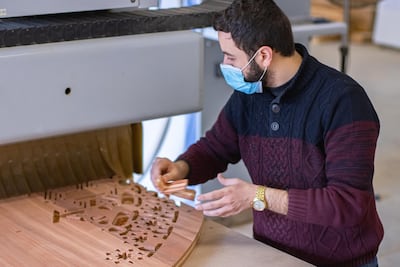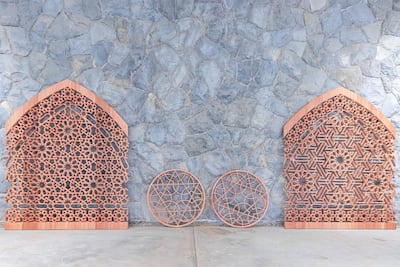The old port district of Al Mina in Tripoli, Lebanon's second-largest city, is best known for its art cafes and bars. But its narrow alleys with stone houses are also home to the city's carpenters.
From his workshop, Elie Mouchaham adds the finishing touches to wooden latticework panels, or moucharabiya. These have been rebuilt for the Villa Linda Sursock, a 19th-century townhouse in Beirut.
The original panels, composed of three arched windows and a large double door, were destroyed by the August 4 Beirut port blast last year. "The biggest challenge is trying to restore all the original details exactly as they were," Mouchaham says.
He is among the many Tripolitan carpenters who are contributing to the reconstruction of Beirut's heritage homes after the explosion. "I'm doing it because I love Lebanon and it makes my children proud," he says.
But his work is also vital in preserving another, intangible, form of cultural heritage: Tripoli's historic woodworking industry. The ageless craft is part and parcel of the port culture of one of the world's oldest continuously inhabited cities.
These family-owned workshops date back generations. “My great-grandfather, Hanna, was a carpenter, and so was his son Antoon, and so was my father, Kostis,” says Mouchaham. “As a child, my dad wanted me to go to school, but I preferred to be in the workshop with him.”
Many of the city's original carpenters were Greek or Armenian craftsmen from the other parts of the Ottoman Empire, who sought new opportunities in this once cosmopolitan port city. Some also came as refugees in the early 20th century, fleeing persecution from Ottoman forces.
"They stopped at Tripoli's port on their way to other cities, and some of them settled there," says Vahe Okaijian, business manager of Al Mina workshop Okaijian, which focuses on architectural woodwork. His great-great grandfather came to Tripoli as a wood merchant from what is now modern-day Armenia.

A modern furniture industry grew out of the French mandate in Lebanon in the early 20th century. “The carpenters furnished the homes of French officers, and they learnt to carve wood in the styles of the French decorative arts,” says Okaijian. “They blended this with Ottoman and local influences.”
By the 1970s and 1980s, the city’s carpenters were known regionally and in the Gulf for producing furniture in the French Classicist, Neoclassical and Baroque styles of the 17th and 18th centuries.
But Tripoli’s decline during Lebanon’s civil war, and years of sectarian violence between two warring suburbs, also caused the woodwork industry to suffer.
Today, it is standing on its last legs, owing to the combined impact of Lebanon's economic crisis and the pandemic. Many businesses have closed down, while the luckier ones are downsizing.
“Before the crisis, I employed up to 46 craftsmen in my workshop, but today I’m working with eight people,” says Mouchaham.

To help save the industry from collapse, the Tripoli NGO Minjara has been connecting the city's carpenters with Lebanese designers.
"I met the Minjara team after the blast, because they were helping out in Beirut. They connected me to Elie," says designer and architect Sara Jaafar, who commissioned Mouchaham to rebuild the moucharabiya panels for Villa Linda Sursock.
The challenge, she explains, has been to piece together the moucharabiya’s original patterns using old photographs and the surviving pieces.
"With handmade panels it's difficult to tell whether some of the geometrical patterns were intentional or a result of human error," she says.
Throughout the process, Mouchaham guided Jaafar on the technical aspects of traditional woodcarving. "For the frames, we've used old cedar wood from Turkey that doesn't expand," Jaafar explains.
The new panels were originally carved out on a digital cutting machine from the Minjara workshop. "But the finishing needs to be done by hand," she says.

A modern inscription commemorating the Beirut blast will appear above the door, to replace an older one in Kufic script.
But it's not only the old that Tripoli's carpenters are focusing on. Today, many are striving to adapt their local know-how to trends in contemporary design.
“People don’t want the styles of Louis XIV and Louis XVI anymore, they want simpler, more minimal furniture,” says Okaijian, who has been taking active measure to evolve his company’s business model.
To help the carpenters cater to these changing tastes, Minjara launched a collection of limited-edition pieces of contemporary furniture.

Among the participating designers was Thomas Trad, who, with Tripolitan carpenter Jihad Toros, developed a series of tables and stools made entirely of wood using different joinery techniques.
"The collaboration helped dispel a lot of negative perceptions I had about Tripoli. The carpenters have amazing skills, especially when it came to combining wood with other materials like brass," says Trad.
“Some of the furniture I saw was old-fashioned, but the carpenters weren’t stuck in their ways and wanted to learn.”
Their collaboration continues to this day.
“He [Toros] often comes to my studio in Beirut to brainstorm ideas, and we talk about Japanese woodwork,” says Trad, who trained in crafting traditional Japanese joineries in Kyoto.
Minjara was originally established in 2018 with EU funding. Its workspace for carpenters is located in the abandoned Tripoli fair, which was designed by Oscar Niemeyer in the 1960s and was never completed.
Regular workshops take place there, and carpenters can use specific equipment and consult the materials library.
"The platform serves to complement the workshops in Tripoli, not to replace them," says Joya Douaihy, Minjara's project manager.
“The workspace includes a materials library and machinery that could help reduce the cost of production.”
In March this year, the initiative was handed over to the Rene Moawad Foundation, a Lebanese charitable organisation. "Our aim is to make the platform self-sustaining by 2023," says Douaihy.
The RMF is currently developing a training programme for the workshop with design professors from the Lebanese Academy of Fine Arts in Beirut. They are also conducting research to identify potential markets in Europe and the GCC.
But is this enough for this historic craft to survive in Tripoli?
Toros fears the industry is already reaching breaking point.
“The cost of wood and other materials has risen up to 30 per cent,” he says, because the industry relies on imported wood from Turkey, Africa and Europe, and oak and walnut from the US.
In addition, sales are dwindling because of the crisis. "We're still getting commissions from clients in Tripoli and Beirut, but fewer people can afford it now," Toros tells me.
Despite these challenges, Mouchaham still hopes his family business will survive long enough for his son to take over.
But, he says, with a tinge of regret, "I want my son to study engineering first, so that he can achieve more than I did."




